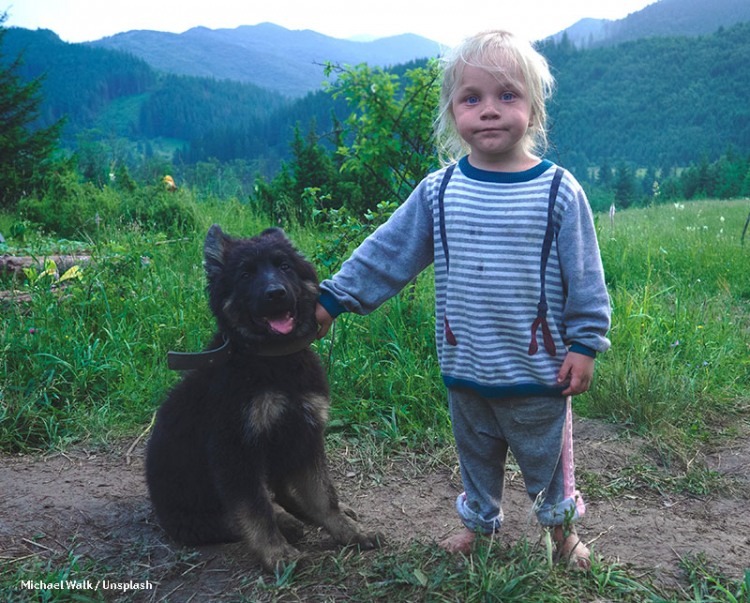Young children in households with dogs exhibited better social and emotional development than those in homes without dogs.
Y

Dogs are little kids’ best friends, too!
By Karen B. London PhD, fist published here July 2020.
ll parents want the best for their children, and it just may be that having a dog is one way to achieve that. In this case, “best” refers to opportunities for optimal social and emotional development as well as for the proper amount of physical activity.
A new study from Australia, which involved children two to five years old from a range of socioeconomic backgrounds, found that young children in households with dogs exhibited better social and emotional development than those in homes without dogs.
In households with dogs, young children were far less likely to have behavioral problems, including losing their temper, general misbehavior and fighting with other children. Children with dogs more often displayed prosocial behavior, such things as being helpful if someone is upset, injured or ill, and being thoughtful about other people’s feelings.
While just having a dog in the household may be good for children, the real benefits come from playing with and walking the dog. The kids who played with their dog at least three times a week and accompanied the adults in the family on walks with the dog at least once a week had higher prosocial behavior scores than kids with dogs who did not interact with them as frequently. These results suggest that even modest amounts of time spent engaging with dogs can make a big difference for toddlers and young children.

It’s unclear exactly how children benefit from these interactions, but few doubt that such interactions are valuable. The benefit may come from the close connection a child feels with a dog, or it may be the practice in understanding non-verbal signals. Another option is that trust and empathy with dogs provide children with opportunities to learn how to experience the world from another’s perspective. Perhaps the benefits are as simple as a happier child, which helps their overall development.
A lot of work has been done on the advantages of having a dog, and much of what has been learned has become common knowledge: dogs provide companionship, ease loneliness, foster trust and empathy, increase physical activity—the list goes on. Until this study, the first to document specific developmental advantages in children age five and under, all of the work focused on older children and adults. The current study also investigated the ways a large number of factors, including early life, education, care and home environments, influence child development.
The authors of the study don’t claim to know why living with dogs is associated with improved social and emotional development in young children. They point out it’s possible that the interaction with the dogs by the children as well as the role-modeling by parents interacting with dogs helps the children develop strong social and emotional skills. The researchers also note that it’s possible homes with dogs are more nurturing environments overall. Perhaps the kind of homes that include dogs are exactly the best at rearing caring, kind and well-mannered children.

Note: Pediatrician Tips is strictly a news and information website about pediatrics. It does not provide medical advice, diagnosis, or treatment. This content is not intended to be a substitute for professional medical advice, diagnosis, or treatment. Always seek the advice of your pediatrician, physician or another qualified health provider with any questions you may have regarding a medical condition for any person. Never disregard professional medical advice or delay in seeking it because of something you have read on this website. The opinions expressed in this column are not always those of Pediatrician Tips and are intended to spark discussion about issues pertaining to pediatrics and pediatricians.






